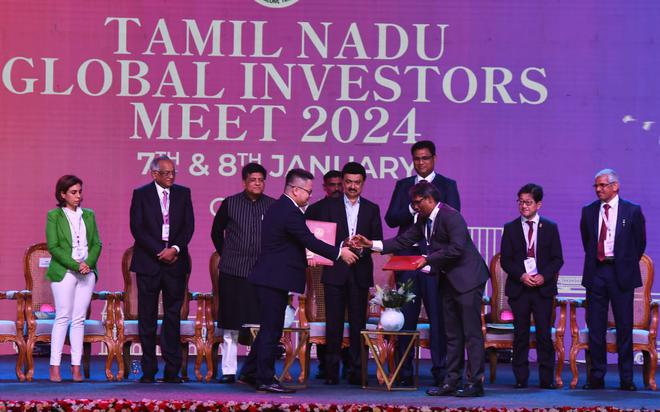The Tamil Nadu Global Investors Meet (GIM) 2024 hosted by the DMK government got off to a blistering start at the Chennai Trade Centre on Sunday with Chief Minister M.K. Stalin unveiling a blueprint for making the State a $1 trillion economy by 2030. The government also released its Semiconductor and Advanced Electronics Policy, 2024, on a day when a slew of memoranda of understandings (MOUs) entailing mega investments were signed.
The vision report provides a comprehensive “growth framework” for achieving Mr. Stalin’s ambitious target. “To achieve the target, we are pursuing a twin-pronged approach of attracting both capital and employment-intensive investments,” he said inaugurating the event.
The GIM, he said, will act as a catalyst for economic and industrial growth. “The event has witnessed encouraging response and is expected to bring pride and investment to Tamil Nadu. Multiple policies have been announced by the State. Our focus is to ensure development for all,” he said.
The previous two editions of the GIM were held in 2015 and 2019 under the erstwhile AIADMK regime.
Union Minister for Commerce and Industry Piyush Goyal, the chief guest on the occasion, said India’s growth is backed by the success of its States and Tamil Nadu stands as a pivotal cog in the wheel. “Tamil Nadu is one of the most ambitious States with the vision of $1 trillion economy by 2030 and the Government of India is working closely with the State government towards taking the State’s inclusive and sustainable growth forward,” he said.
A slew of MOUs were exchanged through the day. The key among them was a pact signed by the State government with Vietnamese electric vehicle (EV) maker VinFast for setting up its plant in Thoothukudi with a proposed investment of ₹16,000 crore.

Tata Electronics signed an MoU expressing an interest to invest ₹12,082 crore for an enclosure manufacturing and mobile phone assembly unit in Krishnagiri district and the project will generate over 40,500 jobs.
Mr. Stalin inaugurated First Solar’s fully integrated solar manufacturing plant in Sriperumbudur. The company also signed a pact to invest a further ₹2,500 crore, which would provide over 350 jobs.
Hyundai Motor India has committed additional investments of ₹6,180 crore for setting up an unit to manufacture internal combustion engine (ICE) and EV passenger cars, and EV batteries in Kancheepuram district and collaborate with IIT-Madras on “Hydrogen Valley Innovation”.
Qualcomm announced a significant expansion in Chennai with a new facility for their Design Centre, representing a proposed investment of ₹177.27 crore. The new Design Centre is expected to generate employment for up to 1,600 skilled professionals.
Apple’s supplier Pegatron inked a pact for investing ₹1,000 crore on a computing, communications, and consumer electronics manufacturing unit in Chengalpattu. This project is expected to generate over 8,000 jobs.
JSW Energy will invest around ₹10,000 crore for its expansion plans in Thoothukudi and Tirunelveli districts. The project would provide employment to over 6,600 people.
Godrej Consumer Products Ltd. is investing around ₹515 crore and TVS Group will be investing ₹5,000 crore to provide employment to around 500 persons. Mitsubishi will be investing ₹200 crore for a project in Gummidipoondi near Chennai.
AP Moller Maersk has signed an MoU for transport and logistics solutions and Global Capability Centres across Tamil Nadu.
In a video message, Mukesh Ambani, chairman and managing director, Reliance Industries Limited, said the company is committed to making new investments in Tamil Nadu in renewable energy and green hydrogen sectors. Jio has invested over ₹35,000 crore in Tamil Nadu, bringing the fruits of digital revolution to 35 million subscribers in every town and village in the State. In December, Jio completed the fastest roll out of 5G anywhere in the world, he said.
Nisaba Godrej, executive chairperson, Godrej Consumer Products Limited said the company aspires to develop the Chengalpattu facility as a “lighthouse factory” where the “best in sustainability, safety and automation is done with an inclusive and gender-balanced workforce”.
“The government has generously given us incentives on our commitment to employ at least 50% of women and 5% of employees from the LGBTQI community and persons with disabilities. This was done not as an exception for us, but as a norm being extended to all willing companies. To me, this offered an impressive glimpse into the very progressive mindset of the State,” she said.
TVS Motor Company chairman emeritus Venu Srinivasan said, “The reason why Tamil Nadu has a conducive environment is due to a very good political leadership, excellent bureaucracy and peaceful law and order [situation]. This is backed by the availability of highly skilled labour and engineers. And that is why leading companies have made Tamil Nadu their destination.”
“As per our data the contribution of our members to Tamil Nadu GDP is around 25% and we expect this to continue to increase,” said R. Dinesh, president, Confederation of Indian Industry (CII).
Industries Minister T.R.B. Rajaa highlighted how the State has been in the top position across several sectors and also pointed out how schemes launched by the State government have helped people. “We have one doctor for every 250 people, which is comparable to Scandinavian countries. We also produce over 1,50,000 engineers every year,” he added.
Bhavish Aggarwal, founder and CEO, Ola Electric; Unsoo Kim, MD and CEO, Hyundai India; René Piil Pedersen, Chief Group Representative, A.P. Moller-Maersk, Singapore; Sajjan Jindal, chairman and director, JSW Energy, also addressed the gathering at the inaugural ceremony.







